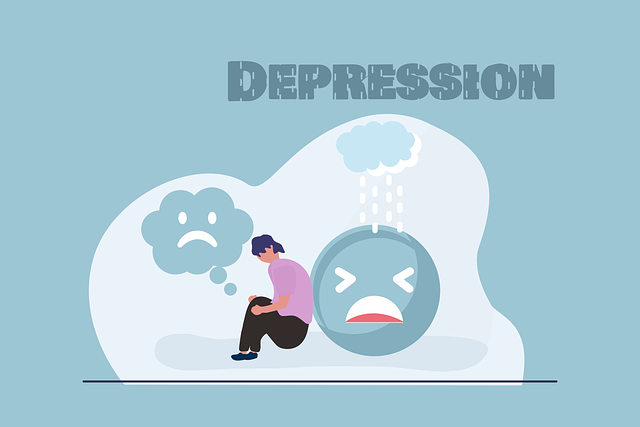Depression, a complex mental health condition with multifaceted causes, can be prevented through a comprehensive approach that includes Westminster Bipolar Disorder Therapy combining medication and psychotherapy, daily healthy habits, support groups, mindfulness meditation, cognitive behavioral techniques (CBT), building resilience, and crisis intervention. Public awareness campaigns destigmatize mental health issues, encouraging early intervention. Specifically, CBT focuses on changing negative thought patterns and cultivating positive thinking to empower individuals in managing and preventing depression, including bipolar disorder, while fostering emotional well-being and long-term mental health resilience.
Depression is a prevalent mental health challenge, but with proactive strategies, prevention is achievable. This article explores comprehensive approaches to safeguard your mental well-being and mitigate the risk of depression. From recognizing triggers and making lifestyle adjustments to harnessing the power of therapy and building resilience, we delve into various techniques.
Discover evidence-based practices, including cognitive behavioral therapies, and learn how Westminster Bipolar Disorder Therapy can offer tailored support. Equip yourself with tools to navigate life’s challenges and foster long-term mental wellbeing.
- Understanding Depression and its Triggers
- Lifestyle Changes for Improved Mental Health
- The Role of Therapy and Support Groups
- Cognitive Behavioral Techniques for Prevention
- Building Resilience: Strategies for Long-Term Wellbeing
Understanding Depression and its Triggers

Depression is a complex mental health condition that significantly impacts an individual’s daily life and well-being. It’s more than just feeling sad or overwhelmed; it’s characterized by persistent feelings of sadness, loss of interest in activities once enjoyed, changes in appetite and sleep patterns, fatigue, difficulty concentrating, and in severe cases, thoughts of death or suicide. While the exact causes are multifaceted, involving a combination of genetic predisposition, environmental factors, and brain chemistry imbalances, understanding these triggers is crucial for prevention.
Cultural sensitivity in mental healthcare practice plays a vital role in recognizing and addressing depression, especially given that symptoms can manifest differently across cultures. Risk management planning for mental health professionals is essential to navigate the challenges of treating depression effectively while ensuring patient safety. Additionally, building resilience through therapy, such as Westminster Bipolar Disorder Therapy, can empower individuals to manage stress, overcome adversity, and maintain emotional balance.
Lifestyle Changes for Improved Mental Health

Mental health is closely tied to our daily habits and routines, making lifestyle changes a powerful tool in depression prevention. Adopting healthy practices can significantly impact our emotional well-being. For instance, regular exercise has been shown to boost mood and reduce symptoms of depression and anxiety. This could be as simple as taking a brisk walk each day or trying out yoga for its calming effects.
Additionally, prioritizing quality sleep is essential. Establishing a consistent sleep schedule and creating a relaxing bedtime routine can work wonders in managing stress levels and improving overall mental resilience. Westminster Bipolar Disorder Therapy often emphasizes the importance of these lifestyle adjustments to support individuals in building inner strength and confidence, ultimately helping to prevent depressive episodes.
The Role of Therapy and Support Groups

Depression prevention strategies often include a combination of professional support and community-based initiatives. One powerful tool in the fight against depression is therapy, specifically tailored for conditions like bipolar disorder. Westminster Bipolar Disorder Therapy focuses on providing individuals with effective treatment plans, combining medication management with psychotherapy. This comprehensive approach addresses not just symptoms but also underlying causes, empowering patients to better manage their mental health.
Support groups play a significant role in fostering recovery and preventing relapse. These groups offer a safe space for individuals to share experiences, gain insights from peers, and learn valuable coping strategies. Incorporating mindfulness meditation practices within these support groups can enhance well-being. Public Awareness Campaigns Development and effective communication strategies are also crucial, aiming to destigmatize mental health issues and encourage early intervention. Through open dialogue and education, communities can better understand and support those facing depression, ultimately contributing to more successful prevention outcomes.
Cognitive Behavioral Techniques for Prevention

Cognitive Behavioral Techniques (CBT) have proven to be highly effective in preventing and managing depression. These techniques focus on identifying and changing negative thought patterns and behaviors that contribute to depressive episodes. By teaching individuals to recognize and challenge distorted thinking, CBT empowers them to develop healthier coping strategies. This approach is particularly beneficial for those at risk of bipolar disorder, as it can help manage mood swings and prevent the onset of depression.
In the context of Westminster Bipolar Disorder Therapy, CBT often involves risk management planning tailored by mental health professionals. This includes learning emotional regulation skills to handle stress and difficult emotions effectively. Additionally, self-care practices such as regular exercise, mindfulness, and maintaining a structured routine are integrated into therapy. These strategies not only support overall mental well-being but also serve as valuable tools for long-term depression prevention.
Building Resilience: Strategies for Long-Term Wellbeing

Building resilience is a crucial aspect of long-term depression prevention and overall mental wellbeing. It involves equipping individuals with the ability to adapt and bounce back from life’s challenges, including managing stress, setbacks, and difficult emotions. This process empowers people to navigate mental health struggles like Westminster Bipolar Disorder Therapy, fostering a sense of control and self-reliance.
Resilience can be cultivated through various strategies such as cultivating positive thinking, practicing mindfulness, and engaging in regular physical activity. Crisis Intervention Guidance plays a vital role here by teaching individuals effective coping mechanisms to handle distressing situations without resorting to unhealthy behaviors. Additionally, Mental Illness Stigma Reduction Efforts contribute by creating a supportive environment where people feel comfortable seeking help and discussing their mental health openly, thereby encouraging earlier intervention and improved long-term outcomes.
Depression prevention is a multifaceted approach that involves understanding individual triggers, adopting healthier lifestyles, seeking professional support, and utilizing evidence-based techniques. By incorporating lifestyle changes, therapy (including Westminster Bipolar Disorder Therapy), support groups, cognitive behavioral techniques, and building resilience, individuals can proactively manage their mental health and prevent depressive episodes. These strategies empower people to take control of their well-being and cultivate a more positive and fulfilling life.














